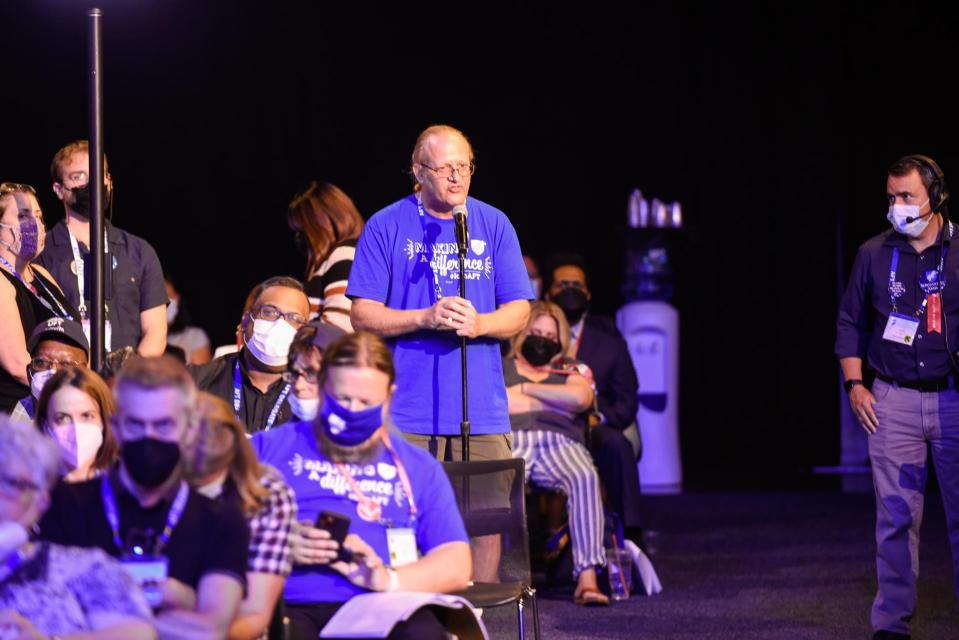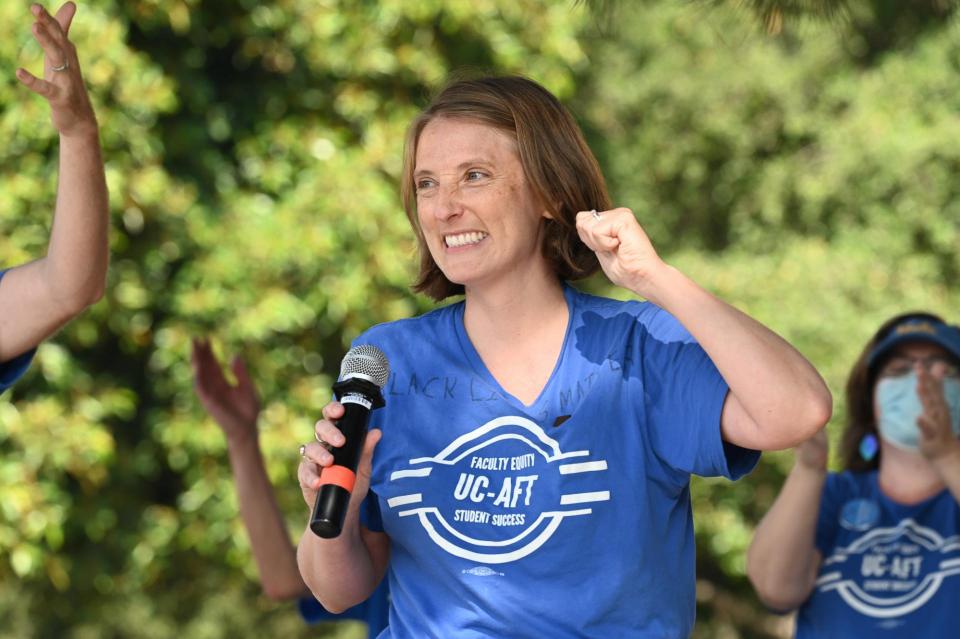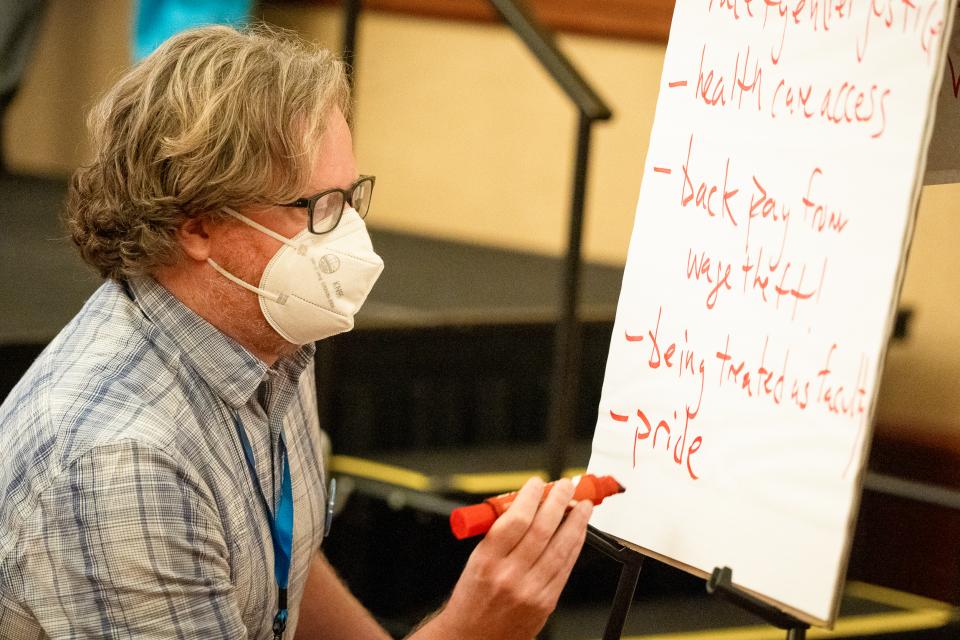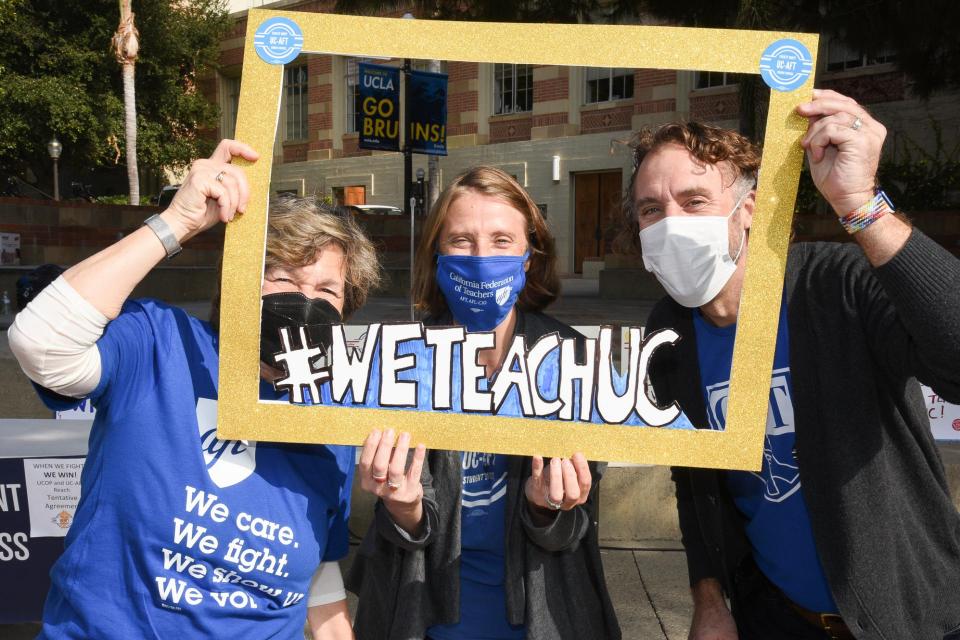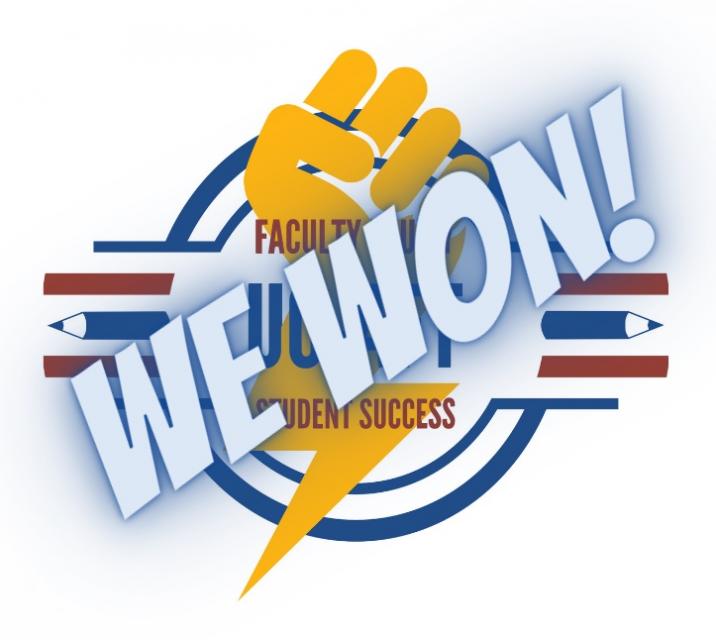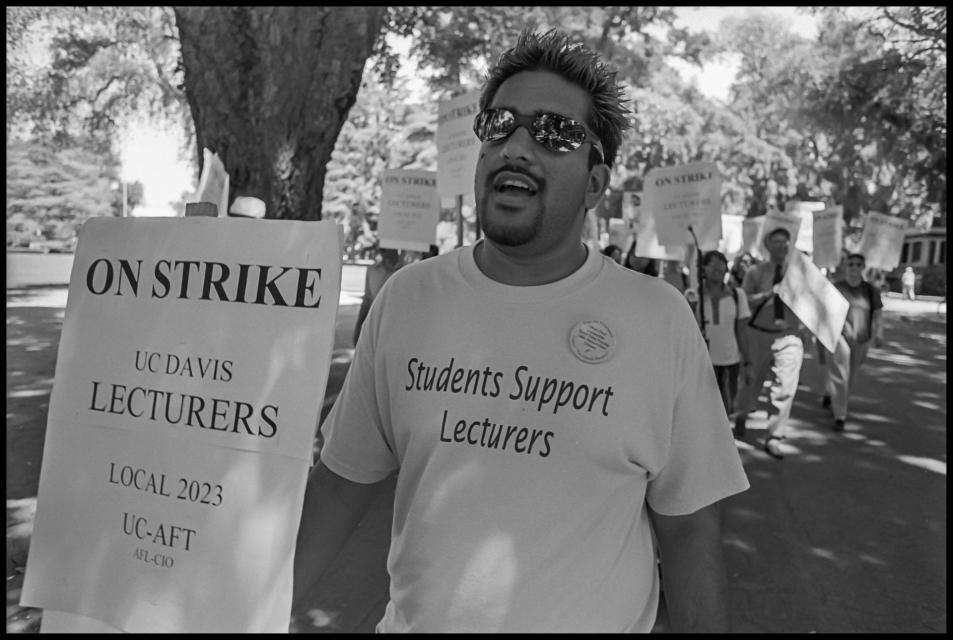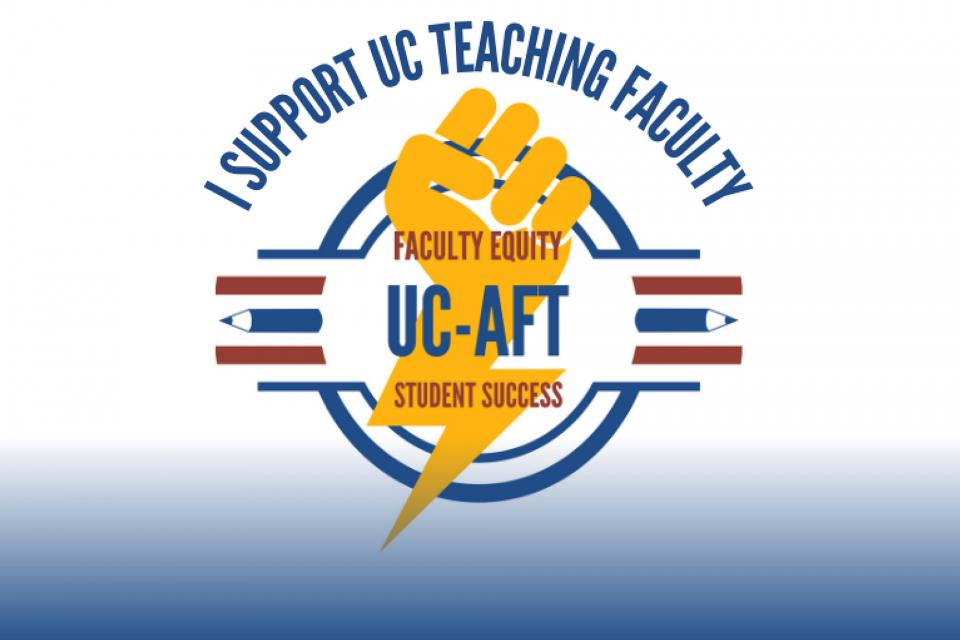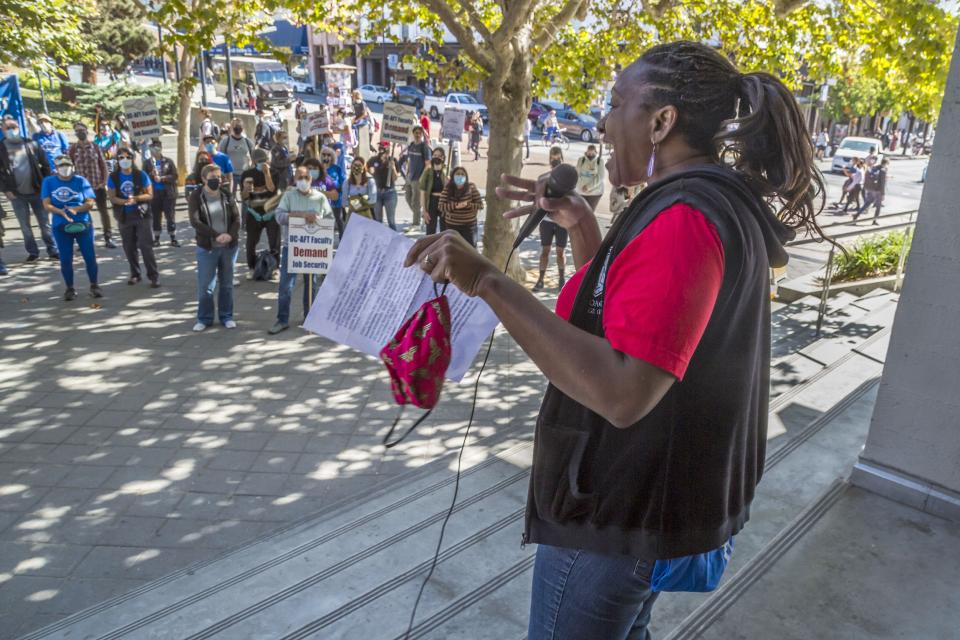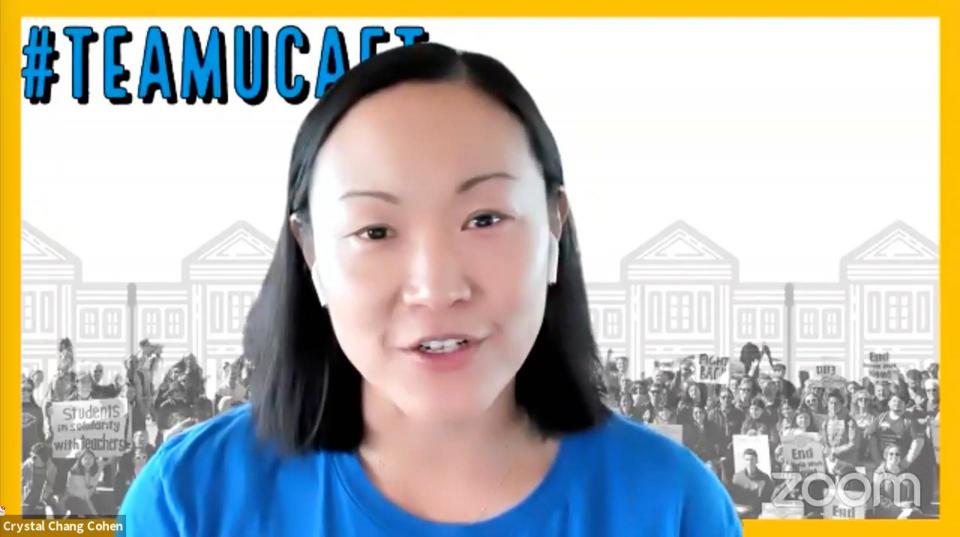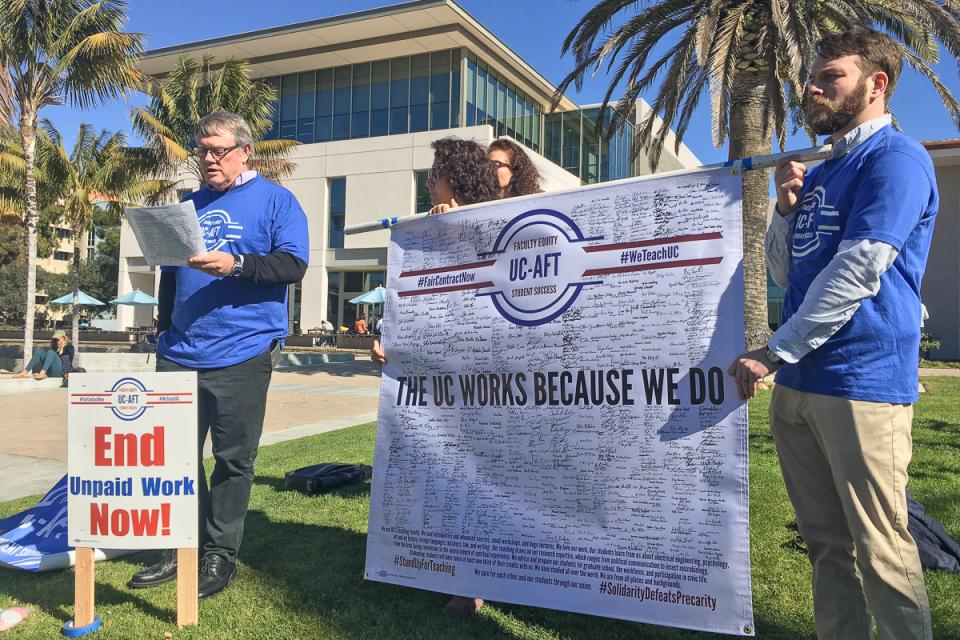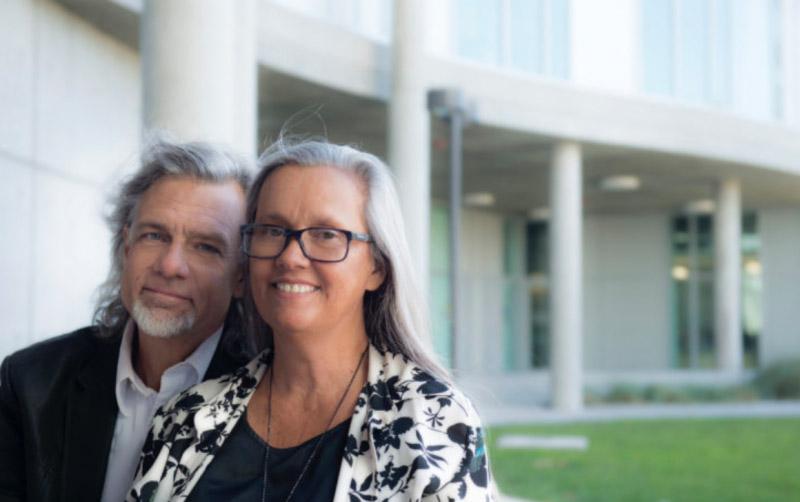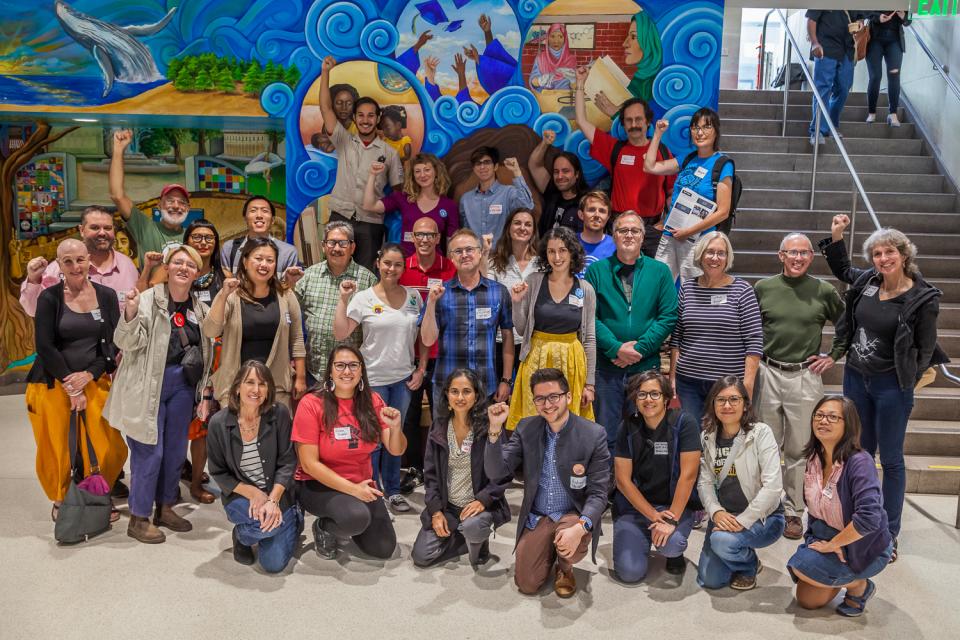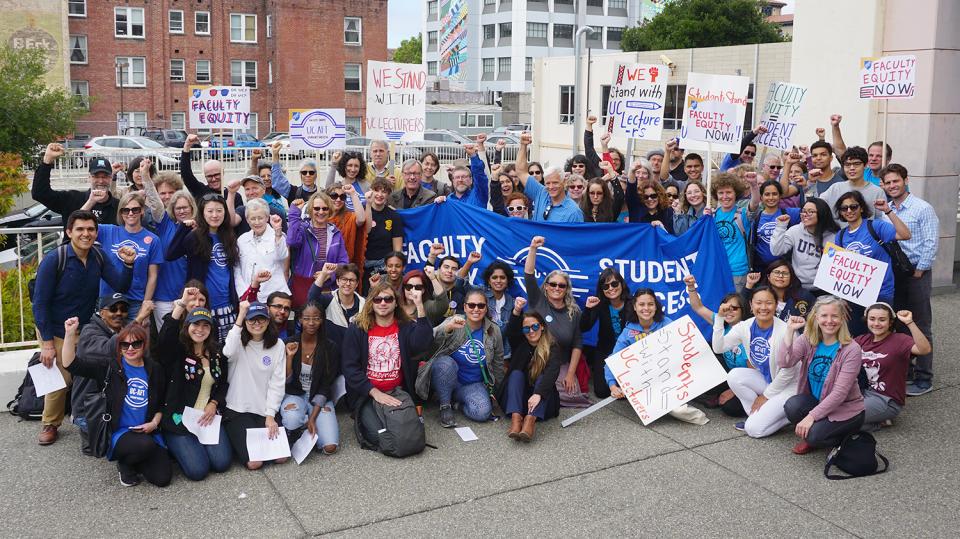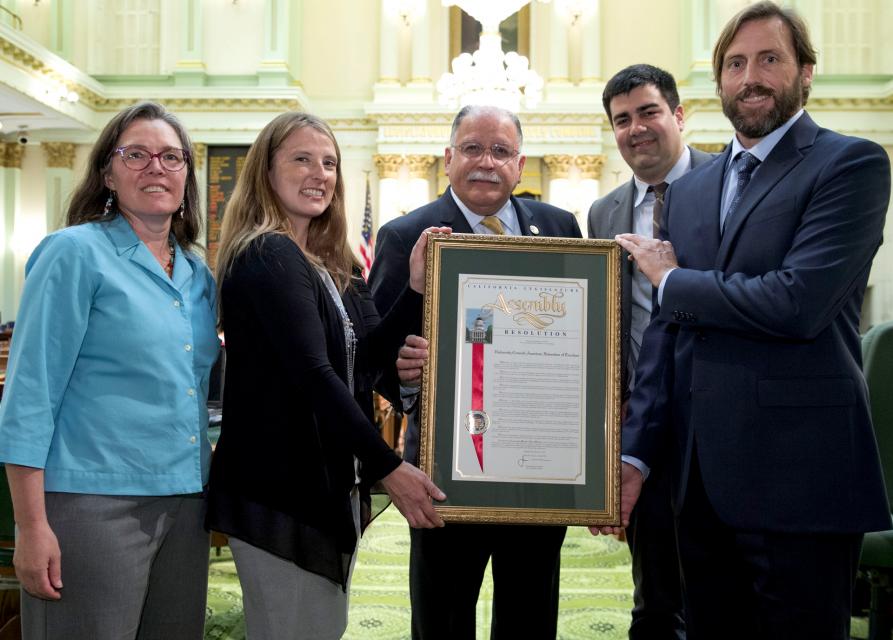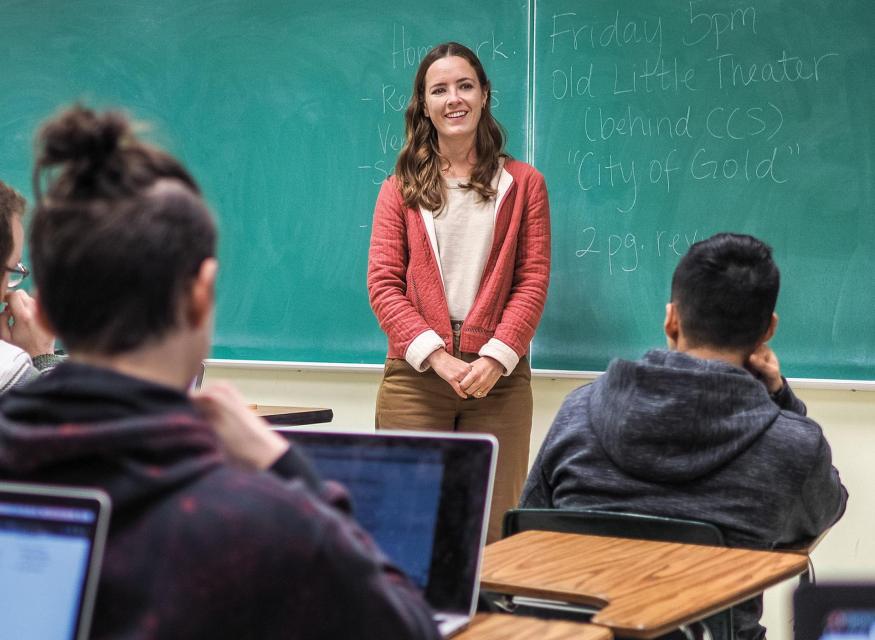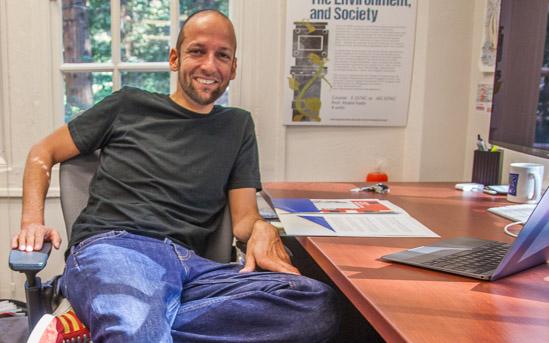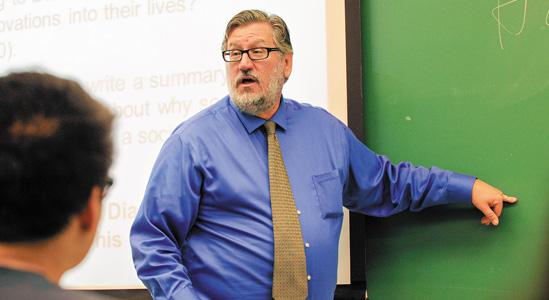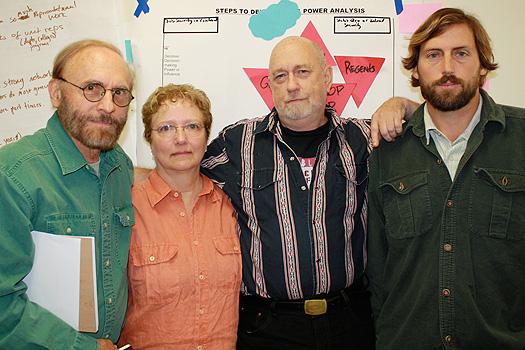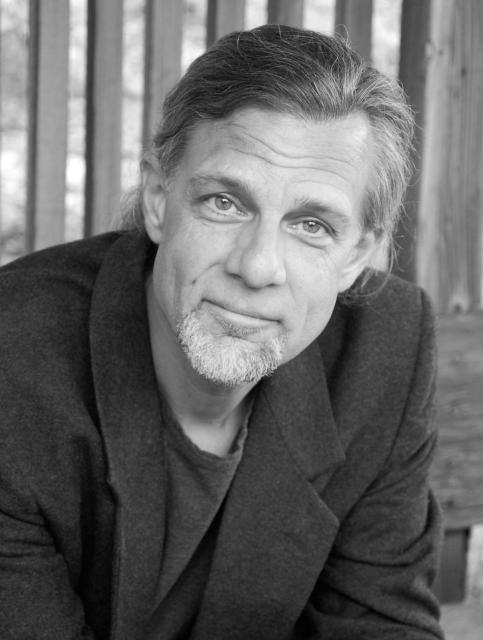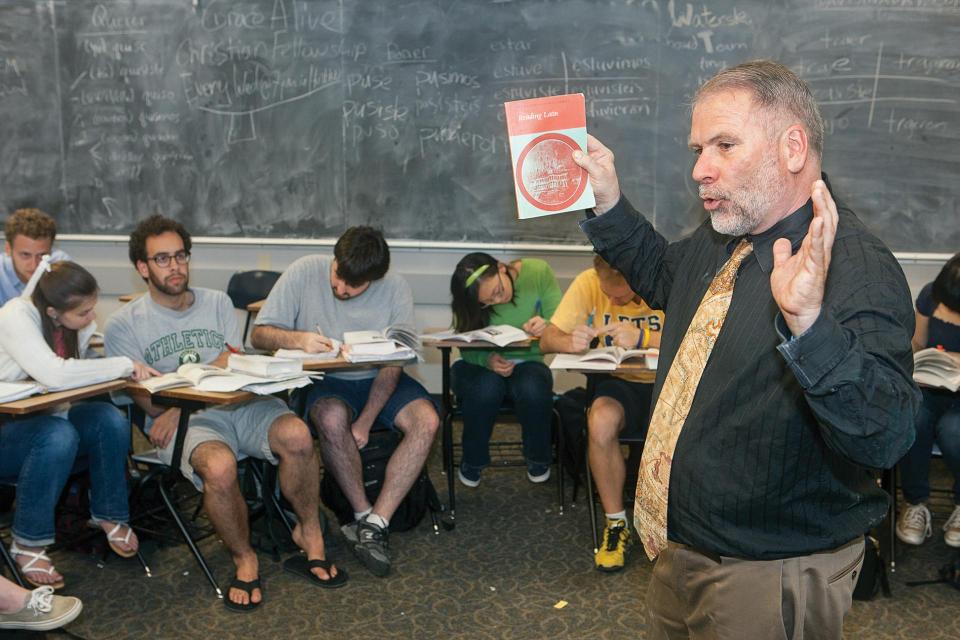AFT resolution asks U.S. Department of Education to conduct higher ed study
Calls for national data about adjunct/contingent pay and benefit inequities
CFT once again demonstrated its commitment to adjunct/contingent faculty by submitting and winning unanimous passage of its resolution “Calling for Department of Education Study of Pay and Benefit Inequity” at the AFT Convention July 15 in Boston.
Retrospective: Organizing to win in tumultuous times
Reflecting on five years of union gains for UC librarians and lecturers
By Mia McIver, President, University Council-AFT
When I was elected president of University Council-AFT in 2017, I never could have predicted that the next five years would be as tumultuous as they turned out to be. I also could never have foreseen how our union of University of California lecturers and librarians would organize, build power, win contracts, and accomplish gains that far exceeded my hopes and expectations.
Two higher education activists join UC-AFT leadership
First woman of color and first labor historian
In a history-making move, the University Council-AFT is taking steps to expand representation in its leadership. Two new vice presidents have been elected, both of whom are contingent faculty from campuses that have not previously been represented — UC Merced and UC Irvine. Iris Ruiz, from Merced, is the first woman of color to serve on the UC-AFT Executive Board. Trevor Griffey is the first labor historian; he also has a pre-continuing and intermittent appointment.
UC lecturers’ victory inspires broad movement for equity across higher education
CFT wages a campaign for part-time faculty in the community colleges
By Jeffery M. Freitas, CFT President
For about three years the University Council-AFT engaged in protracted negotiations on behalf of lecturers in their unit. Their aims have always been about fairness — better working conditions for lecturers and improved learning conditions for students. Their fight has been about not only winning economic and contractual gains for members, but gaining professional respect and recognition for their teaching at the University of California. Their campaign has been a true member-driven effort, rooted in years of organizing by the statewide local that represents both continuing lecturers and librarians, led by their president, Mia McIver, and a committed negotiations team.
UC lecturers greet new contract as “a game changer” and “only the beginning”
PHOTO GALLERIES
UC-AFT negotiates groundbreaking agreement
The view from Westwood
UCLA — It was about 3 a.m., UC-AFT President Mia McIver recalled, when negotiators for the University of California texted the administration’s “final offer.” McIver knew that all major contract issues, from job security to salary increases, were settled. She also knew that 6,500 lecturers were set to strike at all nine UC campuses in a few hours.
BREAKING: Strike averted — UC lecturers reach groundbreaking settlement at 4 am
SUMMARY: UC-AFT reached a groundbreaking settlement with UC administration in the middle of the night. The planned two-day ULP strike has been called off. There will be noon rallies to celebrate today at all nine campuses.
* * * * *
What does a UC-AFT strike look like?
PHOTO GALLERY: Lecturers strike in 2002 for job security
Tenuous system torn apart by denial of three-year contracts to experienced teachers
Anger among lecturers at UC Davis finally boiled over at the end of the spring semester. On May 29 and 30, 2002, non-tenured faculty walked the picket line instead of teaching classes, and turned the campus entrance on A Street into an impromptu educational institution.
Show solidarity with UC-AFT! Join the ULP strike Wednesday and Thursday
Update: The strike is called off after an agreement was reached in the early morning hours of November 17. See the news story.
Late Saturday night, the lecturers of the University Council-AFT announced that they have notified UC management that lecturers will take part in an unfair labor practice strike on November 17 and 18. This strike is about a pattern of bad faith bargaining and unfair labor practices committed by President Michael Drake’s administration.
Lecturers rally at nine UC campuses in statewide action
1700 supporters turn out to stand with lecturers
As hundreds of lecturers, students and other workers at the Berkeley campus of the University of California gathered in front of the MLK Student Center, they began to chant. “UC would not be anything, Without teaching faculty, ME!” Leading them was Lacy Barnes, senior vice president of the CFT, and former full-time faculty member and president of the State Center Federation of Teachers.
Back to the classroom, but no contract
Facing inequity, lack of COVID protections, 96% of UC-AFT members vote to authorize strike
As they have for the past two years, lecturers at the University of California continue their effort to get the administration to bargain a fair contract. The last agreement between the university and the University Council-AFT, expired on January 31, 2020. The union’s negotiating committee has met with UC’s bargaining team on 50 occasions, yet the four most fundamental issues are still outstanding — high turnover rates, lack of performance reviews, widespread uncompensated labor, and compensation itself.
Ask the governor to protect bargaining rights for UC teaching faculty
Send a letter in support of AB 1550 now!
AB 1550, authored by Assemblymember Luz Rivas, has successfully made it through the California Legislature and to Governor Newsom’s desk. The governor has until October 10 to sign it into law.
Job security still on the table for UC lecturers, members vote to authorize strike
UC-AFT keeps the pressure on for fair continuing appointments
Update: On June 1, UC-AFT members voted to authorize a strike, with a “strong majority” of nearly 7,000 members turning out for the vote, and 96% voting to authorize a systemwide strike should the UC Office of the President fail to meet UC-AFT’s collective bargaining demands.
Now – yes, now – is the time for contingent faculty to organize
If we don’t fight now, we may not get another chance
By Josh Brahinsky and Roxi Power, UC-AFT Santa Cruz
When graduate-student workers at the University of California at Santa Cruz voted overwhelmingly in December to reject their statewide union contract and follow the West Virginia teachers’ model of a wildcat strike, the precarious lives of academic workers became a news story once again.
Thousands of UC lecturers mobilize for job rights, fair salaries
Academic and blue collar workforce fight back against university’s substandard pay
When Josh Brahinsky isn’t teaching “Academic Literacy and Ethos” and “Brain, Mind, and Consciousness” classes to new students at UC Santa Cruz, the lecturer is researching bio-cultural anthropology at Stanford University, teaching at San Jose State, or leading online classes at Bucks County Community College in Pennsylvania.
“UC only pays me $19,900 yearly,” Brahinsky said. “That’s not enough to live on, so I have to make up the difference somewhere else.”
How one career lecturer’s medical crisis is helping others win paid sick leave
UC-AFT fights for what’s right in healthcare
It’s not often that a personal medical ordeal results in a positive outcome that helps many other people, but that’s what happened when Andrew Tonkovich, a lecturer at UC Irvine, had to receive treatment for a brain tumor.
Finding “common ground” in higher education
Campus Equity Week conference brings together contingent faculty from all higher ed systems
Members, officers, and activists from higher education unions throughout California came together for a full day during Campus Equity Week to chart a strategy for defending public higher education. They denounced especially the way education institutions, under corporate pressure, increasingly rely on contingent instructors while treating them as outsiders.
UC lecturers take bold stand with university in negotiations
Momentum has built activism and organizing success
Eighty UC-AFT members and their allies showed up at the first bargaining session at UC Davis as lecturers began their contract negotiations last spring. The impressive number of rank-and-file members in the room to support the team helped them win open bargaining, says UC-AFT President Mia McIver.
UC-AFT recognized on Assembly Floor
Assemblyman Jose Medina, D-Riverside, Chair of the Higher Education Committee, recognized the University Council-AFT on the Assembly Floor during UC-AFT’s first group lobby day at the State Capitol on April 1.
Student assessments unreliable for evaluating instructors
Biased opinions may effect reappointment for contingent faculty
Evaluation can be a harrowing experience for any educator. But for non-tenured faculty in the UC system, the emotional drain is compounded by the critical role that evaluations play in whether a lecturer continues to work at all.
Building a member-driven union at the university
An effective site rep structure reaches lecturers, librarians where they work
At UC Berkeley, 16 lecturer site representatives are fanning out across the sprawling campus. In Davis, the union is fielding at least 15. In both places, the effort to meet the challenge of a new era in public sector labor relations is part of an even larger move to change the culture of the union.
UC Riverside instructor leads contract bargaining
A lot more than compensation is on the negotiating table
His voice may be a little hoarse and his cold is still hanging on, but Ben Harder is there for the start of bargaining. Harder leads the negotiating team of UC-AFT lecturers. Their contract expires June 30, and the talks started March 3.
UCLA professor leads mobilization of lecturers and librarians
Statewide campaign builds on established strength in campus locals
Goetz Wolff has taught at UCLA for more than 20 years, but was generally more involved with Southern California’s vibrant labor movement than with the union on his job. Wolff, for example, earned high praise for his six years as research director at the Los Angeles County Federation of Labor, but barely knew the ins and outs of the University Council-AFT.
Tonkovich teaches and organizes with humor, joy and irony
UC Irvine lecturer and author credits mentors, and Ronald Reagan, for his activism
Q&A with Andrew Tonkovich
Andrew Tonkovich is a lecturer in the English department at UC Irvine and president of UC-AFT Irvine, Local 2226. He edits the literary magazine Santa Monica Review, and hosts Bibliocracy Radio, a weekly books show on KPFK 90.7 FM in Southern California. Recent short stories, essays and reviews of his have appeared in Faultline, The Rattling Wall, OC Weekly and the Los Angeles Review of Books.
Classics lecturer maintains classic ideas about unions
New local president Rundin says union makes lecturer job worth having
Classics lecturer John Rundin feels privileged to pass on to another generation the cultural treasures that were given to him by the previous generation. The teacher of Latin and ancient Greek is one of two recipients of this year’s Award for Excellence in Teaching from the UC Davis Academic Federation.
“I live my job, love what I do, and I love my students,” says Rundin. “It is a great honor.”

